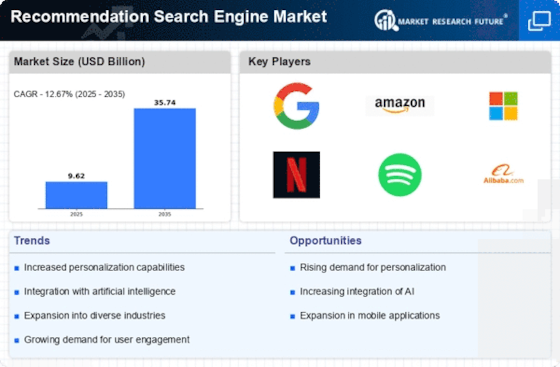Top Industry Leaders in the Recommendation Search Engine Market

The Competitive Landscape of Recommendation Search Engine Market:
The Recommendation Search Engine (RSE) market is experiencing explosive growth, fueled by the ever-expanding digital landscape and the insatiable user demand for personalized content. Players in this dynamic arena employ diverse strategies to carve out their space and attract users. Understanding the competitive landscape is crucial for both established companies and new entrants aiming to navigate this burgeoning market.
Key Players:
- IBM (US)
- Google (US)
- SAP (Germany)
- Microsoft (US)
- Salesforce (US)
- Intel (US)
- HPE (US)
- Oracle (US)
- Sentient Technologies (US)
- AWS (US)
Strategies in Play:
- Data Advantage: Data is the lifeblood of RSEs. Players with access to vast amounts of user data and sophisticated data analysis techniques gain an edge in delivering personalized recommendations. Google, Amazon, and Microsoft, with their established ecosystems and extensive user data, excel in this aspect.
- Algorithmic Innovation: The engine powering recommendations holds immense value. Companies invest heavily in R&D to develop cutting-edge algorithms that leverage AI, machine learning, and natural language processing to deliver relevant and timely suggestions. Netflix's focus on collaborative filtering and Spotify's use of recurrent neural networks for music recommendations are examples of algorithmic innovation.
- User Experience Focus: Personalized recommendations are meaningless if not delivered seamlessly. Companies like Zillow prioritize user interface design and context-aware recommendations to enhance user experience and drive engagement.
- Partnership Ecosystem: Strategic partnerships with content providers, e-commerce platforms, and other relevant stakeholders expand reach and access to new user pools. Spotify's partnerships with music labels and Netflix's collaborations with production studios are prime examples.
Market Share Analysis:
Analyzing market share in the RSE market requires a nuanced approach. Traditional metrics like revenue alone paint an incomplete picture. Factors to consider include:
- Platform Reach: The number of users engaging with the recommendation engine is a crucial indicator of market penetration. Google's Search and Amazon's e-commerce platform give them a significant edge in terms of reach.
- Recommendation Accuracy and Personalization: The ability to deliver highly relevant and personalized recommendations directly impacts user engagement and conversion rates. Netflix's high content completion rates and Zillow's accurate property suggestions are testaments to their effective personalization strategies.
- Technology Innovation: Being at the forefront of algorithmic development and incorporating cutting-edge technologies like AI and NLP sets leading players apart. Google's AI-powered Recommendations API and Amazon's personalized product search based on user reviews are examples of technological innovation.
New and Emerging Players:
The RSE market is constantly evolving, attracting new entrants with innovative approaches:
- Context-Aware Recommendations: Startups like Hypermind and Pointillist focus on providing context-specific recommendations based on user location, time of day, and other real-time factors.
- Explainable AI: Companies like Limelight and Whyzer strive to build transparent recommendation engines that explain their reasoning to users, addressing concerns about algorithmic bias and data privacy.
- Vertical Specialization: Niche players like TrueFacet in fashion and BookBub in literature cater to specific user demographics and interests with tailored recommendation algorithms.
Investment Trends:
Companies are pouring significant resources into the RSE market, with key investment trends including:
- REaaS Adoption: The rising demand for REaaS solutions is fueled by the ease of integration and cost-effectiveness for businesses. Independent providers like RecSys and Criteo are benefiting from this trend.
- AI and Machine Learning Integration: Investing in advanced AI and machine learning capabilities is paramount for developing sophisticated recommendation algorithms. Tech giants and independent providers alike are heavily invested in this area.
- Focus on Privacy and Transparency: The growing emphasis on user data privacy and ethical AI practices is prompting RSE companies to build trust with users through transparent recommendation systems and robust data security measures.
Latest Company Updates:
January 3, 2024, Walmart announced a partnership with Kibo Commerce, a provider of e-commerce personalization solutions, to improve its recommendation engine capabilities.
January 2, 2024, A study by researchers at MIT found that recommendation engines can perpetuate filter bubbles, leading to users being exposed primarily to information that confirms their existing beliefs.
December 27, 2023, The European Commission published a draft proposal for regulating recommendation algorithms, raising concerns about potential bias and discrimination.










